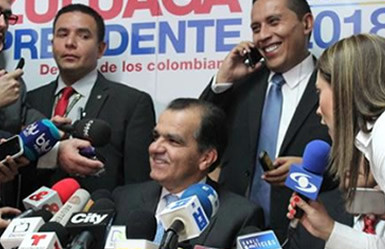The Washington Post & the OAS Secretary General
The OAS needs to be reformed, but the changes need to emerge from accurate analysis of the problems confronting both Latin America and the OAS.
The first round of the Colombia’s presidential election, which took place on May 25, was full of surprises. Defying initial predictions, Óscar Iván Zuluaga won the election with 29.26% of the vote, besting President Juan Manuel Santos’ 25.6%. The performances of leftist Clara López and conservative Marta Lucía Ramírez, each garnering some 15% of the vote, were also surprising. Santos and Zuluaga now enter a runoff election, to be held on June 15.
To explain the dramatic turns the campaign has taken, as well as the Colombia’s future outlook, the Dialogue hosted three esteemed Colombian journalists. Daniel Pacheco, who works for El Espectador and Caracol Televisión, was accompanied by Sergio Gómez from El Tiempo and Juan Carlos Iragorri of Semana in a dynamic discussion moderated by Dialogue president Michael Shifter.
Looking forward, both Santos and Zuluaga are promoting relatively similar economic platforms. While, according to Pacheco, Zuluaga might end up offering more subsidies to those sectors that have supported him in his campaign, all three journalists agree that whoever wins will give continuity to the successful economic trajectory under Santos.
But there is one crucial difference that largely accounts for Zuluaga’s unexpected success, and that will continue to influence voters’ choice: the peace-accords with the FARC. Iragorri commented on the public’s perspective of the on-going peace process. “People don’t want to have a peace process. They simply want peace,” he said. Both candidates are offering different solutions to achieve it. Santos staked his reelection around the ongoing Havana peace accords, which, according to Gómez, have dragged on for too long and created a sense of public mistrust. Zuluaga, on the other hand, built his platform in opposition to the Havana accords, promising a harsher approach against the FARC, similar to that of his mentor Álvaro Uribe, who ruled the country between 2002 and 2010.
Even if his name doesn’t appear on the ballot, Uribe is certainly a protagonist in the election. All three experts agree that the former president seems to have an overbearing presence over the electorate. When asked what went wrong for Santos in the first round, Gómez signaled Uribe’s relentless attacks against the incumbent. Uribe’s hardline approach, from which Santos departed once he assumed the presidency, is fondly remembered by most Colombians. Pacheco and Iragorri commented on how the concept of Uribismo had introduced itself in the Colombian political sphere, while the notion of Santismo did not even exist. A Zuluaga victory, in this sense, would signify a further consolidation of Uribismo. “What is at stake is whether Álvaro Uribe returns to power or not,” said Iragorri.
But with a relatively minor difference in votes, and with Marta Lucía Ramírez and Clara López no longer on the field, the outlook remains uncertain. Zuluaga now has the support of Ramírez, and even made a pact that he will no longer suspend negotiations with the FARC. Pacheco said that, despite the left’s disunity, Santos still hopes to garner the bulk of Clara López’s votes. As part of his campaign for peace, Santos unexpectedly vowed to abolish the military draft should a peace deal be reached. World Cup games on June 15, according to Gómez and Iragorri, may influence the number of voters that decide to give up their soccer game in order to go out to the polls. This was worrying prediction, given turnout was already exceptionally low during the first round. With all cards on the table, and with no definite frontrunner, June 15 promises to be an exciting ordeal.
The OAS needs to be reformed, but the changes need to emerge from accurate analysis of the problems confronting both Latin America and the OAS.
Although politics has cyclical features, and ideology is sometimes a factor in choices made by Latin American voters, the left-right labels obscure more than they illuminate.
Peruvians want an evolution, not a revolution.
 CD
CD